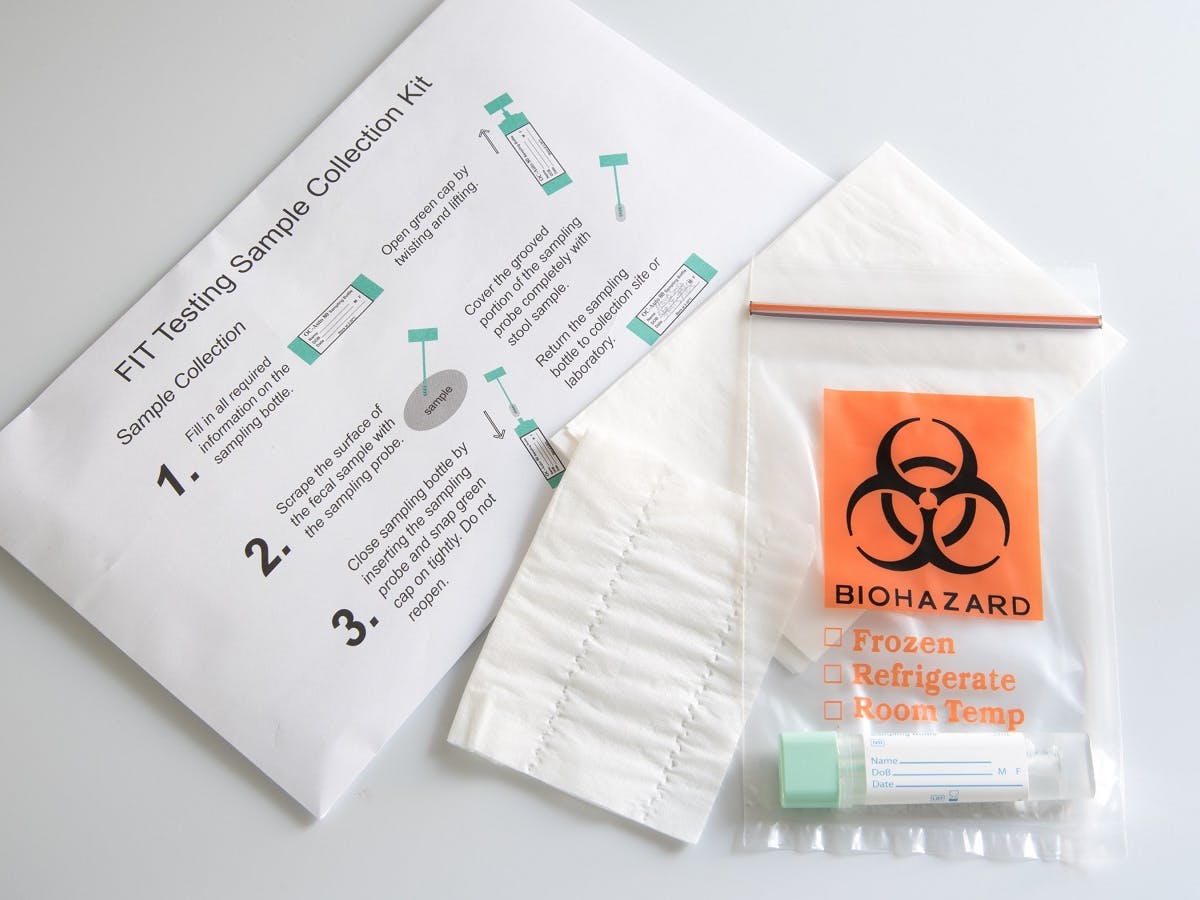
There are several tests available that detect blood in stool, sometimes the first indicator of colon cancer.
Did you know that one out of every five people between ages of 50 and 85 have never had a colonoscopy? That’s a lot of people, especially considering colon cancer is the second most common cancer in the United States.
On the other hand, maybe the number of colonoscopy-skippers isn’t all that surprising. After all, the prep for colonoscopy is, shall we say, less than pleasant.
If you’re one of the many people putting off colonoscopy, you’ve probably wondered about the at-home stool tests advertised on television. These non-invasive tests check for blood in your stool, blood that often can’t be seen with the naked eye. Couldn’t you just do this test instead?
Is a stool test as good as a colonoscopy?
The short answer is no. Although a recent study suggests colonoscopy may not be as perfect as once believed, the procedure remains the gold standard for colorectal screening. What’s more, polyps that may lead to cancer can be removed during a colonoscopy, immediately reducing your risk of getting colon cancer. A stool test can’t do that.
That being said, stool tests are reliable enough that doctors do recommend them for patients reluctant to undergo colonoscopy.
In an interview with CNN, Dr. Douglas Owens, a former chair of the U.S. Preventive Services Task Force, said that while a colonoscopy is best, “the main thing is to get screened. It doesn’t matter if you use a stool test or you get a colonoscopy, pick one. Pick whichever one suits your preferences, but do it.”
Taking a stool test
There are two main types of stool tests. One type looks for occult (meaning hidden) blood in the stool. Both the FIT test and the gFOBT test look for hidden blood. The tests are between 70 and 80% accurate.
The second type of test looks for changes in DNA. The FIT-DNA test is over 90% accurate.
Cologuard, one of the most well known stool screening tests, looks for both blood and abnormal DNA.
Your doctor can advise you which test is best for you. If you don’t have a doctor, Cologuard offers a link to an online medical specialist who can order the test for you, if appropriate.
What your stool test results mean
If your test comes back negative, it means you probably do not have colon cancer. Depending on the test you took, you should repeat the stool test every 1-3 years. Stool test screening is more frequent than colonoscopy screening because it’s not as accurate.
If your test comes back positive for blood in your stool, don’t panic. There are a number of conditions that can cause blood in your stool.
Hemorrhoids
The most common culprit of rectal bleeding, hemorrhoids (also known as piles) are caused by swollen veins in the rectum. Pushing too hard during bowel movements, lifting heavy items, pregnancy, and being overweight can all put a person at greater risk of having hemorrhoids. Thankfully, it’s not usually a severe medical issue.
Anal fissures
These happen when the skin in or around the anus tears, causing bleeding. The condition is also pretty common and not life threatening.
Ulcers
These sores on the lining of the digestive tract can sometimes cause blood in the stool. The stool may appear black and with a consistency like coffee grounds. Ulcers need medical attention.
Inflammatory Bowel Disease (IBD)
There are two types of IBD — Crohn’s disease and colitis. With these conditions, the intestines become swollen and inflamed. Patients with IBD need ongoing medical assessment and care.
Polyps
Polyps are growths of tissue that develop inside the small intestine, colon, or rectum. They often bleed as waste passes through the body. Most polyps are benign, but they can sometimes turn into cancer. That’s why it’s important they are found and removed early.
If your fecal blood test comes back positive, you won’t know the reason. It’s important to follow up with a colonoscopy to be sure.
Does Medicare cover stool tests for colon cancer?
Yes, as long as you have a referral from your doctor or nurse practitioner, Medicare covers a yearly gFOBT lab test. Medicare will also cover a FIT-DNA test once every three years for people who are at average risk of colorectal cancer, don’t have signs of colorectal disease, and are between the ages of 50 and 85.
And good news! Medicare will now cover a colonoscopy after a positive stool test, the same as it does for other screening colonoscopies.
Do you have Medicare questions? We have answers.
When it comes to Medicare, one plan definitely does not fit all. At ClearMatch, it’s our mission to match you to the policy that best serves your unique needs. It’s all we do, and we do it better than anyone. Check out our extensive library of articles for answers to your Medicare questions. Or, compare plans in your area to get started finding the policy that’s right for you.
Additional Resources
Does Medicare Cover Colonoscopy?
Internal Website Link
Does Medicare Cover Preventive Care?
Internal Website Link
Does Medicare Cover Cologuard?
Internal Website Link



